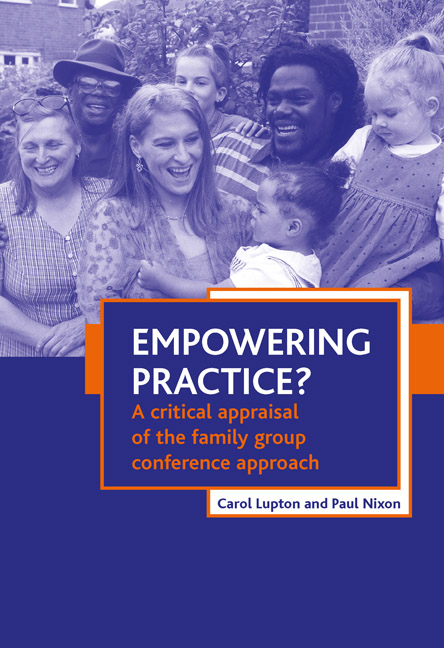Book contents
- Frontmatter
- Contents
- Preface
- Acknowledgements
- Introduction
- one The dilemmas of empowerment
- two Partnership and empowerment in children’s services
- three Lessons from New Zealand
- four Empowering professionals?
- five International perspectives
- six Empowerment in process?
- seven Assessing outcomes in child welfare
- eight Empowering outcomes?
- nine Conclusion
- Bibliography
- Index
nine - Conclusion
Published online by Cambridge University Press: 05 July 2022
- Frontmatter
- Contents
- Preface
- Acknowledgements
- Introduction
- one The dilemmas of empowerment
- two Partnership and empowerment in children’s services
- three Lessons from New Zealand
- four Empowering professionals?
- five International perspectives
- six Empowerment in process?
- seven Assessing outcomes in child welfare
- eight Empowering outcomes?
- nine Conclusion
- Bibliography
- Index
Summary
As we explained in the introduction, we had several key objectives in writing this book. The first was to examine the nature and meaning of the idea of ‘empowerment’ in the child welfare context, using the operation of family group conferences (FGCs) as an illustration; the second was to assess the extent to which and ways in which the FGC approach represents a vehicle for the empowerment of the children and families involved. In examining these two questions the text has examined the findings from much of the available national and international research. A further objective of the book has thus been to evaluate the adequacy of the existing ‘evidence-base’ on the FGC approach and to identify areas where additional research is needed. Finally, the book is not intended as a purely academic discussion of the ideas and debates surrounding empowerment, nor just a researcher-eye view of the issues involved in the operationalisation and measurement of empowerment objectives. It set out to achieve both these things, but also to evaluate dispassionately the strengths and weaknesses of the FGC approach so that its current practice may be improved where necessary and lessons learned, where relevant, for other areas of work with children and families.
We began the book by discussing the politically and conceptually slippery concept of empowerment. Of particular importance to the assessment of an initiative such as the FGC is its ability to mean all things to all people, whatever their political standpoint. In the context of public sector rationalisation, it is important to note the ease with which the FGC rhetoric can resonate, on the one hand, with the commitment to greater user involvement and participation and, on the other, with the desire to reduce the extent of State support for families. More broadly, it is evident that the political promotion of the idea of empowerment contains regulatory as well as liberatory potential and we need to be clear, in specific contexts, where the particular balance between these two attributes actually lies. It is also evident that the notion of ‘empowerment as professional practice’ is surrounded by a range of dilemmas, not the least of which is the (self-contradictory) possibility of the unwilling participation of service users in professional-led empowerment initiatives.
- Type
- Chapter
- Information
- Empowering Practice?A Critical Appraisal of the Family Group Conference Approach, pp. 179 - 186Publisher: Bristol University PressPrint publication year: 1999



